May 6, 2024 | Nature
May 3, 2024 | Earth.com
Student profile: Good digs leads to netting beach volleyball’s international stage for this Lassonde Mineral Engineering student.
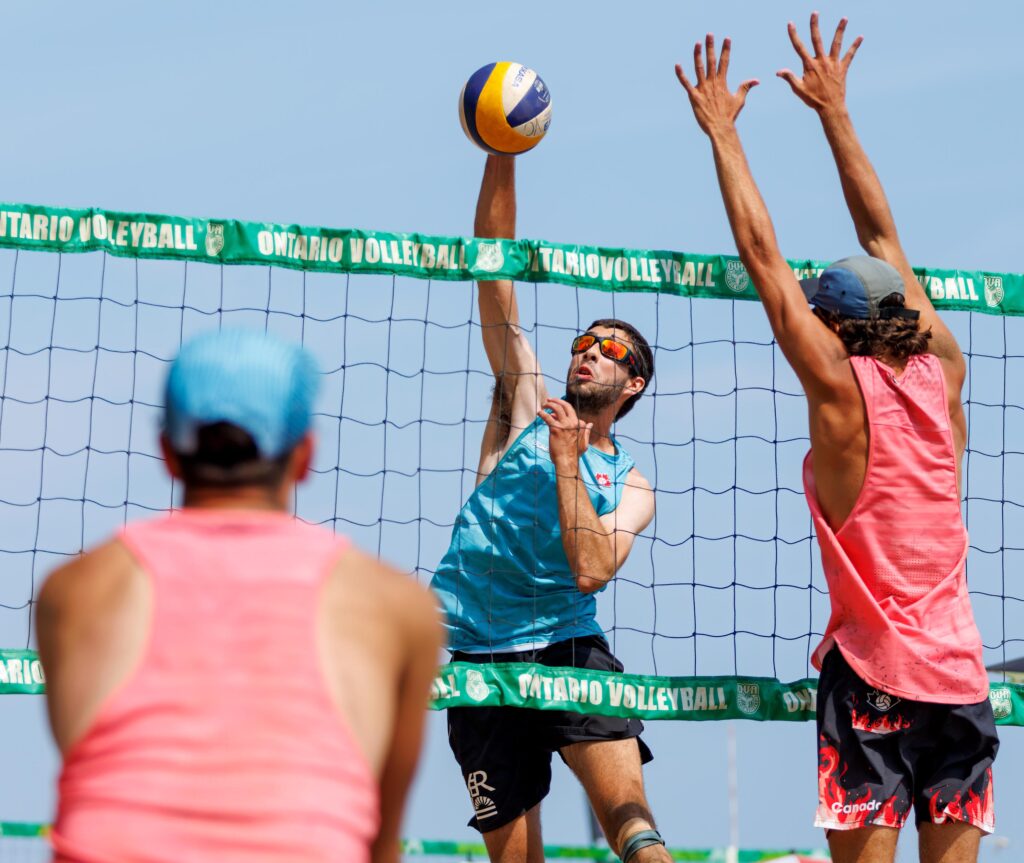
Charlie Ellinas (Year 3 MinE) finds success playing beach volleyball while simultaneously taking on the Lassonde Mineral Engineering program at U of T Engineering. CivMin chats with Charlie to see how he’s balancing the pursuit of competitive sports, a demanding academic program and life on campus. Setting himself up for breakpoint, Charlie rallies to ace this year.
Please tell us a little bit about yourself.
My name is Charlie Ellinas and I’m from Etobicoke – I’ve lived there my whole life. Ever since I was a child, I have always loved playing sports. Throughout primary school, and beyond, I played many sports like baseball, soccer, hockey… basically everything I could. Then, when I got to middle school, I was introduced to volleyball.
My mom played volleyball at the University of Waterloo. I wound up playing for the same club she played for and even had the same coach as her. Then, after some time, I started playing beach volleyball. I played high level baseball but eventually stopped playing because I fell in love with beach volleyball and have played it every summer since.
How did you make the transition from indoor volleyball to beach volleyball?
It wasn’t too hard for me because I have always been athletic. I like it more than indoor volleyball because you are forced to rely more on your own athleticism. Since it is just you and your partner, you can have a greater impact on winning or losing. And I really enjoy that about it!
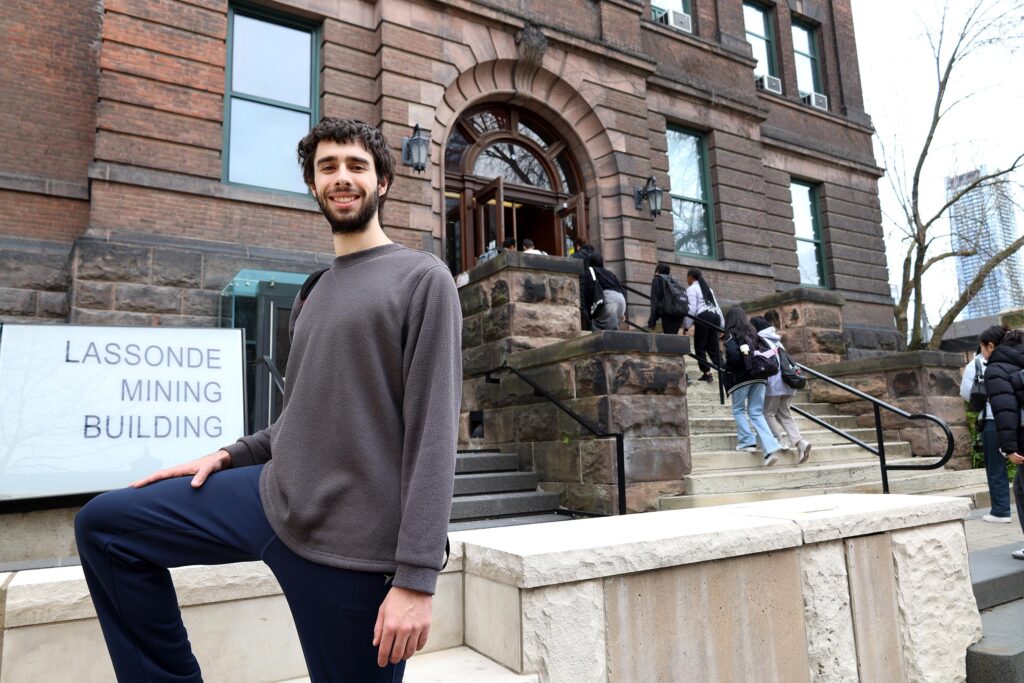
“With all the electric cars, mining is going to be even more important. Everything is either caught, grown or mined, so mining will definitely open doors for the future.”
What drew you to U of T?
The main reason I came to U of T was because I wanted to stay at home – I still live at home. Also, U of T is one of the best schools in the world with Engineering ranked 20th and 10th for mining engineering. I originally had no idea that I wanted to go into Min. I wasn’t sure what I wanted to do but applied to Engineering because I knew it would set me up for the future.
My parents really pushed me to go into Mining because they said, “With all the electric cars, mining is going to be even more important. Everything is either caught, grown or mined, so mining will definitely open doors for the future.”
Another thing that drew me to Min is the potential scholarships. My first year I got the Lassonde Scholarship, which was a scholarship for entering the Min program. The next year I was awarded the Reginald J. Redrupp award. This year, I was awarded the Shell Canada scholarship. Something about Min that has been great is there is more of an opportunity to be awarded scholarships as it is the discipline with the fewest number of students.
You’re in your third year now. Did you go to U of T Camp [CME358 – Civil & Mineral Practicals] last summer? How did you find the experience?
I was happy heading up to Camp. I arrived late, because earlier that day my beach partner and I won the under 20 Beach Volleyball Canadian National Championships. I couldn’t sleep that first night because I was so excited about our victory. I was a bit skeptical of camp – I thought, whoa, this is going to be a lot of work and I wasn’t enjoying it at the start. But then, once we really got going, I started to embrace it more. I got a lot closer with many of the mineral engineering students and even many of the civil engineers. Overall, I found survey camp to be a great bonding experience.
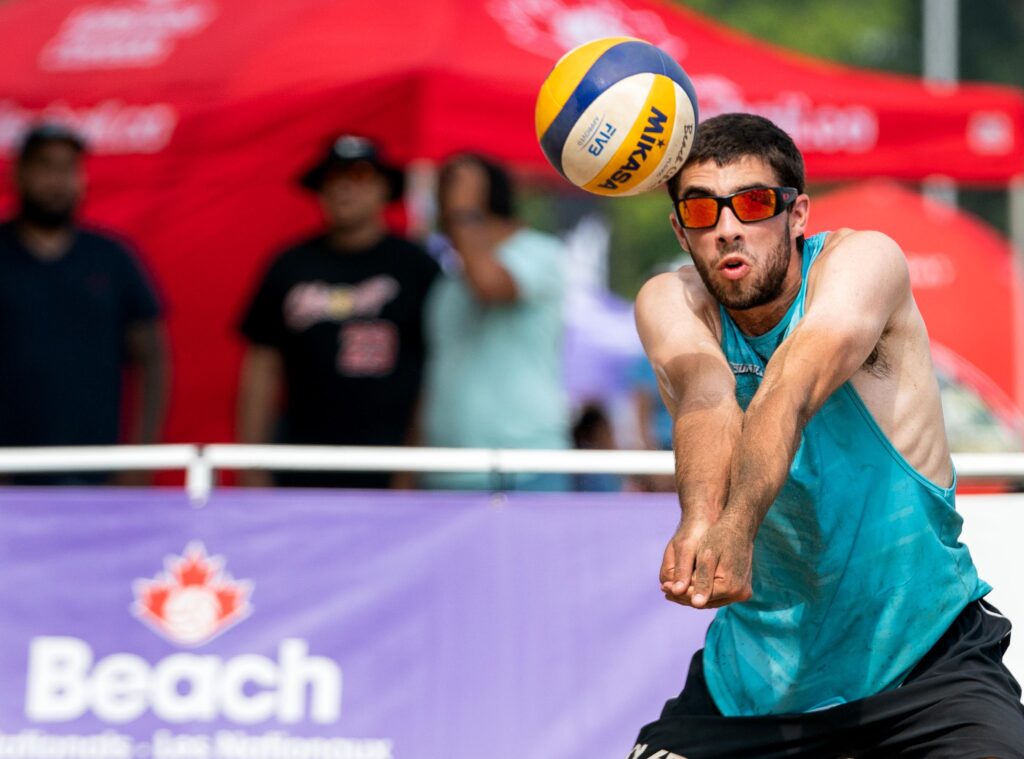
There are three units – how did you fare? A lot of group work and you’re getting experience with fieldwork as well. How did that go?
The first unit we had was the topographic mapping. I think it may have been the hardest station. Because I arrived late, I ended up getting placed in a group of four instead of three, which helped split the workload. We also had a member who surveyed over the summer. This was helpful, as he taught us how to set up the total station and the tripods – this gave us a big advantage over the other groups.
Are you involved in anything else at school? Any clubs or groups?
Yes, I went to the [Canadian] Mining Games this year with other members of Min Club. It was my first time and a great experience. My events included the jackleg [drilling] competition, surveying – of which I already had a bit of knowledge because of Survey Camp – and the mine rescue. The jackleg was very physically demanding, and the mine rescue event involved climbing a rope, breaking down a door while using a crowbar, and using CPR knowledge.
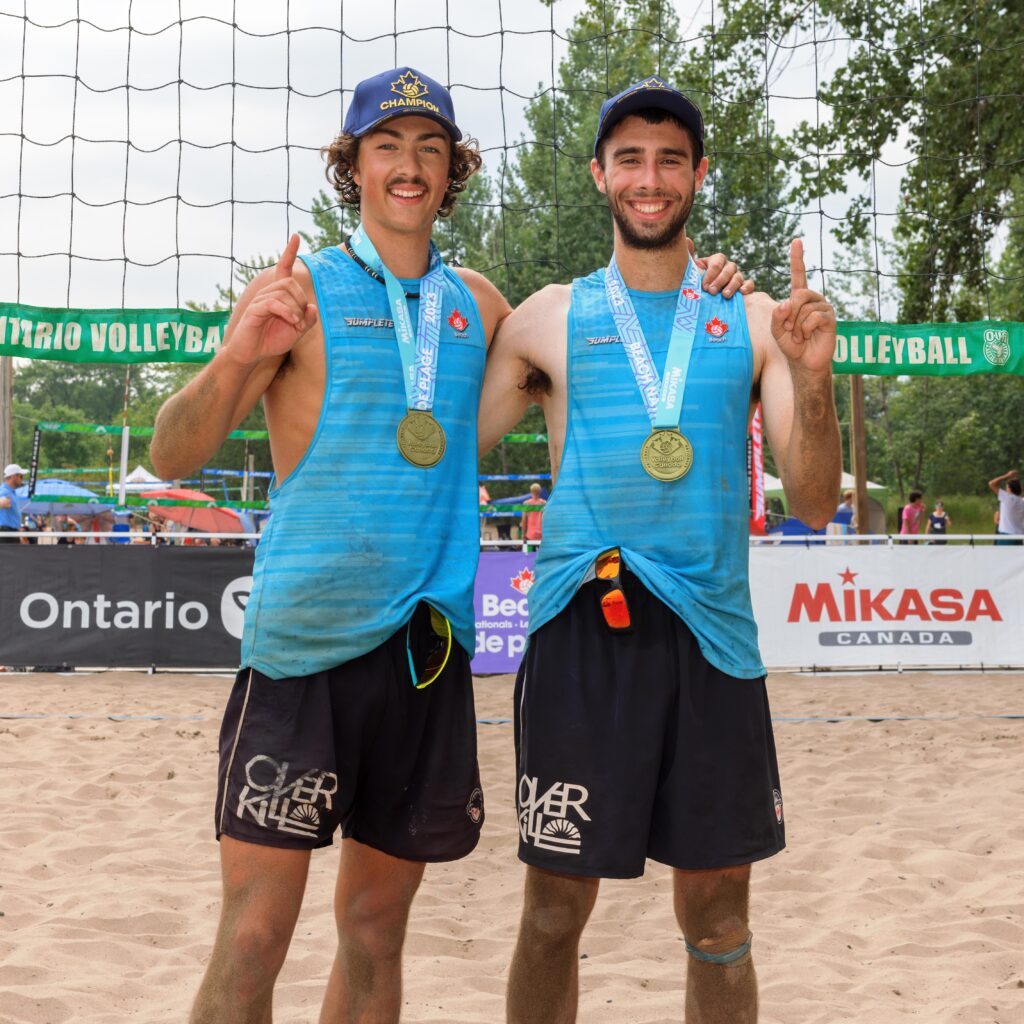
How do you balance your heavy academic engineering workload and keep up with your athletic pursuits? The beach volleyball competitions are usually outside of school and its schedule. Do the events take you to different places and work with your otherwise demanding schedule?
Volleyball competitions mainly occur during the summer. Because of Ontario’s climate there is really only the Beach Volleyball National Training Centre in Downsview, and I can’t access the centre very often during the academic year due to the timing of classes, so I primarily play throughout the summer months. However, earlier this year, my beach partner and I won the Under 20 National Championships. As a result, we got to represent Canada in Thailand at the Under 21 World Championships in November [2023].
Due to this, we had a rigorous training schedule from September through to the tournament date in November. The tournament was held in Roi Et which is a small town in Thailand. It was a great experience because I got to play against the best players in the world. The residents of Roi Et also loved the tournament as they don’t often see many big sporting events like this. I also had never signed so many autographs or taken so many pictures with people before. It was amazing to be a part of it.
Is there a place on campus that is your go-to study spot, or a place to meet up with friends?
On days I’m at school, where there are large breaks in between classes, I’ll normally spend time in the [Min Club] common room. I’ll be there talking to some of my friends in my program – upper years and some lower years as well. When I am doing schoolwork, I normally go to the fourth floor of the Lassonde Mining Building. The Mining Building is great because there are not many people, it’s quiet, and you can easily study there.
Do you have any favourite courses, professors, or somebody who made an impact on you?
My favourite year so far has been third year, as almost all of our courses were strictly about mining. I really enjoyed the underground mining course with Professor John Hadjigeorgiou. I just had the exam for it today and I felt like I learned a lot from the course. The professor taught me more about the industry, the expectations, and potential job positions. I also enjoyed the first-year [MIN191] Introduction to Mineral Engineering course. I knew very little about mining before starting my program so this course opened my eyes to the industry.
You’re finishing third year now. Are you considering a PEY Co-op placement? [professional experience year]
I am planning on taking a PEY placement. However, I do not have a position yet because I’m looking to start working in September as I don’t want to miss out on the beach season since it’s such a short season. Most of the positions will be released sometime around the beginning of May so I am going to start applying for positions when my exams end. I’m also hoping to get a fly-in fly-out position.
Do you have a unique talent or some other special hobby or skill or something that’s unusual? Something we wouldn’t otherwise know about?
I played musical instruments throughout middle and high school. I played the piano from a young age and I was in the string orchestra and played the violin from grade six to 12. I attended a music school, John G. Althouse, from grade six to eight since it was my home school. For high school I attended Richview Collegiate Institute which also had a music program. I played on many sports teams throughout middle and high school, and I was even recognized as the Athlete of the Year in my senior year of high school.
“If I were you, I would look for a fly-in fly-out position and travel all over the world on my time off.”
What might you be looking forward to in a career in mineral engineering?
One thing I am looking forward to is travelling. With mining, you can travel all over the world, especially with fly-in, fly-out positions. I’m interested in doing this at the start of my career. Fly-in fly-out rotations involve working 12-hour days when you’re on. I remember Professor John Harrison saying to us, “If I were you, I would look for a fly-in fly-out position and travel all over the world on my time off.”
By Phill Snel
*ED NOTE: Several volleyball puns were used in this article. How many can you spot?
April 30, 2024 | The Jerusalem Post
CivMin chatted with Tushar Sethi, a passionate international MEng student balancing his career and studies in construction management.
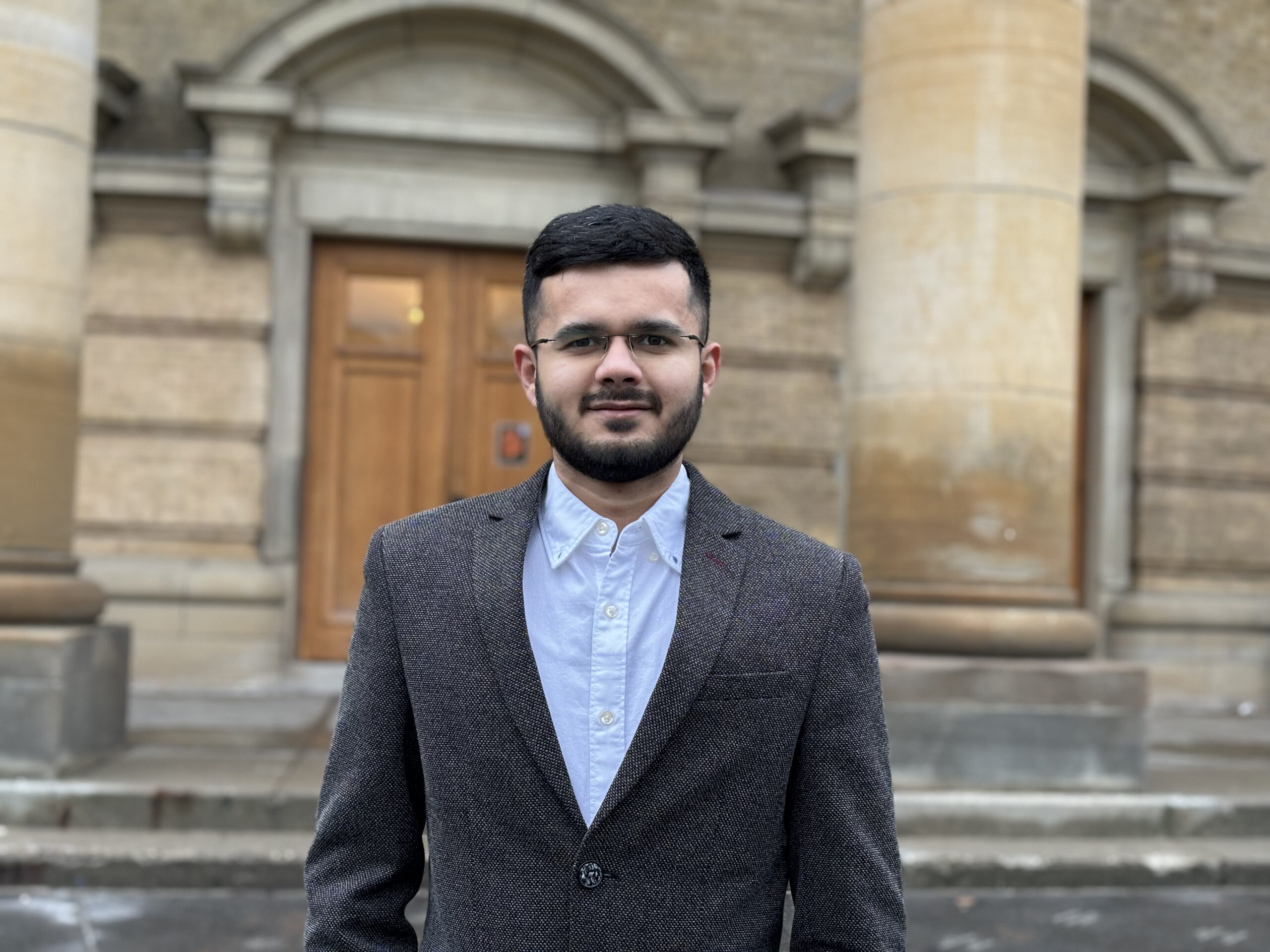
Could you introduce yourself, please?
My name is Tushar Sethi. I’m in the final semester of the Master of Engineering [MEng] in Civil & Mineral Engineering.
What were your courses (emphasis)?
I am specializing in Construction Management with a second emphasis in Entrepreneurship, Leadership, Innovation and Technology in Engineering [ELITE].
Could you recall any projects/assignments completed in your program/emphasis, which helped you build your portfolio or helped you during the interviewing process?
In my Life Cycle Assessment and Sustainability of Engineering Activities CIV1307H course, I worked with a team to analyze the carbon footprint of concrete, the most widely used construction material. Substituting cement in concrete with Supplementary Cementitious Materials (SCM) lowers the impact of GHG emissions from cement, which accounts for 8% of global emissions. Performing the life cycle assessment of concrete with different SCMs by using locally produced raw materials from Ontario helped us study the impact of these materials on climate change, ozone depletion and human toxicity. The lessons I learned from this project can be applied directly in the industry to reduce the GHG emissions of concrete and drive the construction industry towards a green and sustainable future.
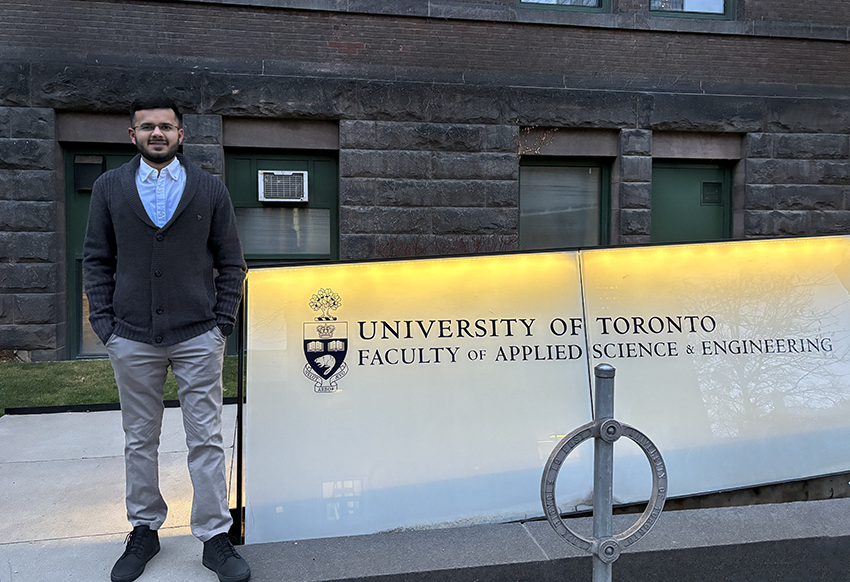
Why did you decide to pursue an MEng degree at U of T?
Pursuing an MEng degree at the University of Toronto was a strategic decision that aligns well with my background in large infrastructure projects. During my early years of working in the construction industry, I realized that this industry is very reluctant to adopt new technologies with a long way to modernize and automate the current means and methods adopted in massive construction projects. Looking at the curriculum offered in the MEng program provided me with an opportunity to learn and contribute towards implementing start-of-the-art AI capabilities into these construction projects to focus on reducing the carbon footprint by transforming conventional techniques into sustainable and resilient systems. Additionally, the faculty members for MEng at U of T comprise industry professionals with vast hands-on experience delivering their expert knowledge directly in the classroom to elevate the learning experience. Courses in MEng are industry-focused and crafted professionally, helping me gain technical and transferable skills and make a smooth transition from academia to a professional journey.
As an international student, how did you find Toronto after moving here? Did you receive any support from the Center for International Students' Experience?
As an international student, I found Toronto to be a vibrant and diverse city that offered a wealth of support and resources for newcomers regarding culture, education, and opportunities by being welcoming and inclusive. Toronto’s multicultural character was immediately apparent and incredibly refreshing. I was excited to immerse myself in the city’s vibrant arts, music, and food scenes, discovering new experiences that broadened my horizons.
The Centre for International Experience (CIE) at the University of Toronto was particularly helpful in easing my transition. The CIE provides a range of programs and services tailored to the needs of international students. I remember the orientation sessions, immigration advising, and community-building activities that helped me feel welcomed, connected, and informed about the resources we have at our disposal. The CIE also connected me with campus and community resources to support my academic, social, and personal well-being. One-on-one advising sessions offered by the University Health Insurance Plan were of great help to me when I needed some advice for medical assistance during my first semester of the program. The tours organized by CIE to experience the neighbourhoods surrounding Toronto allowed me to discover and explore the city while connecting with other students along the way. Their dedication to supporting international students like me made a significant difference in my experience of settling into Toronto and thriving as a student.
What is your favourite study spot on campus?
My favourite study spot on campus was the newly built Students Commons building. It’s a modern and sophisticated facility with large windows allowing natural sunlight that helps me concentrate. The Milt Harris Library at Rotman School of Management was my go-to place, with a deck on the fifth floor where I enjoy a good view of the campus and study.
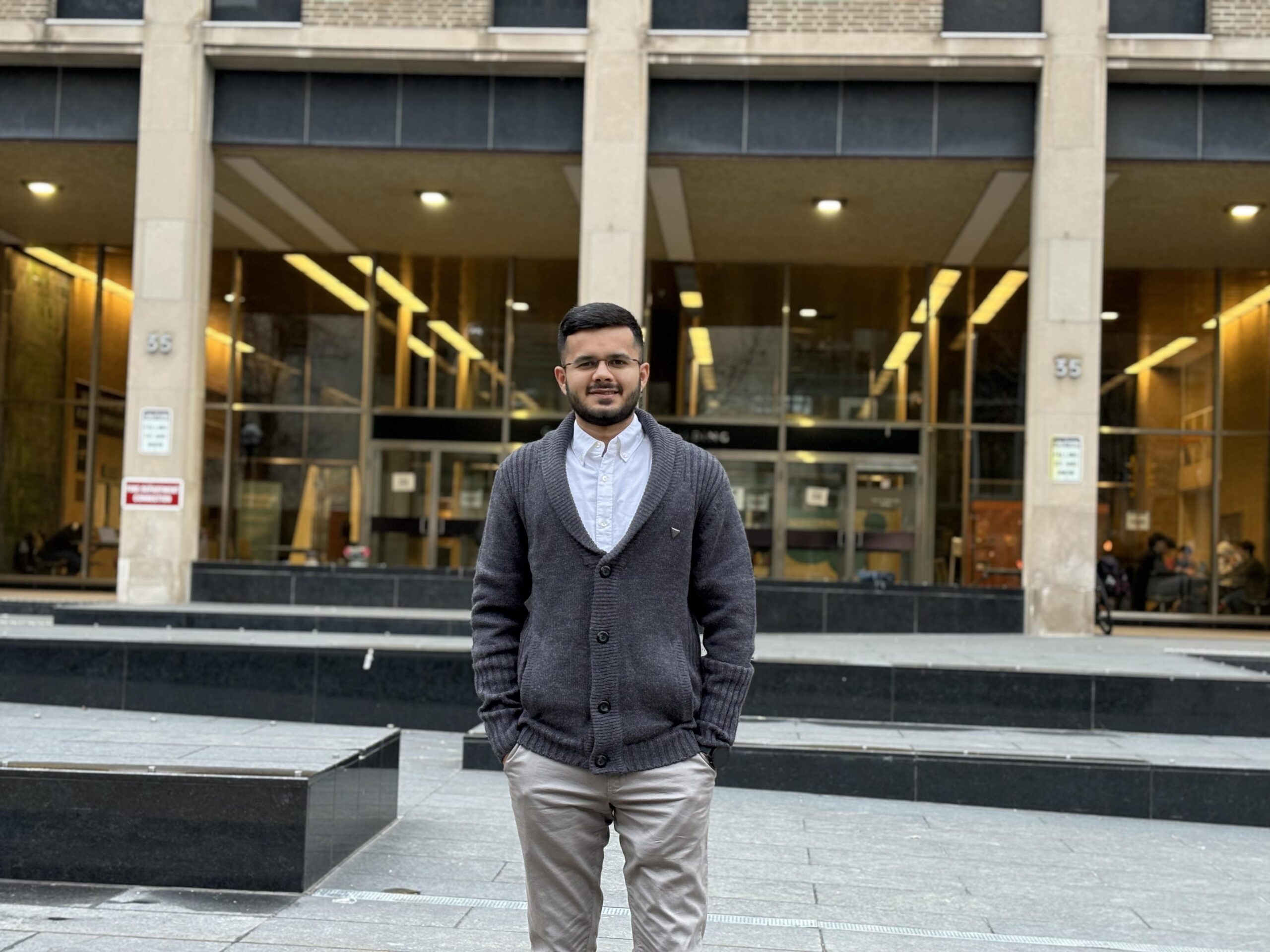
How did your practicum go?
I did a short practicum with my current employer, KAPP Infrastructure Inc. They focus on infrastructure projects in Southern Ontario. During my practicum, I was responsible for supporting the estimation and bidding of a wide range of roads, bridges, culverts, watermain and sanitary transmission projects. My practicum experience illuminated and reinforced many of the academic concepts I learned in various courses of my MEng program.
Are you still working with them?
I currently work in the Estimation Department with KAPP Infrastructure. My role is to explore new infrastructure opportunities in the market from different municipalities and private sector developers in GTHA, then screen the projects that fit in our portfolio and area of expertise. I work on estimating the costs associated with the project to prepare a competitive bid. I emphasize improvising the means and methods by implementing value engineering to optimize the cost. I enjoy my work as it gives me a sense of satisfaction by contributing to public infrastructure projects that add value to the community and leave a positive impact on society.
How did the knowledge gained in the Program help you during your practicum? Does it still benefit you in your job?
The knowledge and skills I gained during my MEng program helped me focus not only on the technical aspects involved in the construction but also examine how it impacts our environment and what systems can be implemented in these projects to make the entire process more sustainable and resilient. Optimizing the costs involved with these multi-billion-dollar projects saves money that can be used for the welfare of society. Working with sustainable materials, understanding the contract documents, enhancing project management systems, using modern BIM-based [building information modelling] tools for estimation and implementing digital project management tools are some of the vital takeaways from my program that cater best to simplify the professional challenges I face at work.
Any plans for the future?
I wish to continue my learning by developing new skills that can enhance my engineering and management expertise. I plan to pursue an MBA program at Rotman after gaining professional experience in the industry. I wish to develop a professional course someday for MEng students and get back to the university to connect with students and help them by sharing my knowledge. I aim to build and deliver an engineering marvel of infrastructure with the potential to positively impact the lives of millions of people.
Any suggestion for future international MEng students?
My suggestion for future students is to focus on learning new skills by experimenting and not just rely on the conventional methodology. Plan your program well by choosing coherent courses and never underestimate the potential of networking with peers, industry professionals, professors, and friends. Be a part of the diverse learning experience that U of T has to offer. Take part in industry nights and connect with like-minded people to explore the countless possibilities and opportunities waiting for you.
One fancy quote from you.
Learning gives creativity, Creativity leads to thinking, Thinking leads to knowledge and knowledge makes you great.
By Galina Nikitina
April 28, 2024 | American Association for the Advancement of Science (AAAS)
Richard and Paul Kosztowniak are teammates on the field, in real life and at Skule™
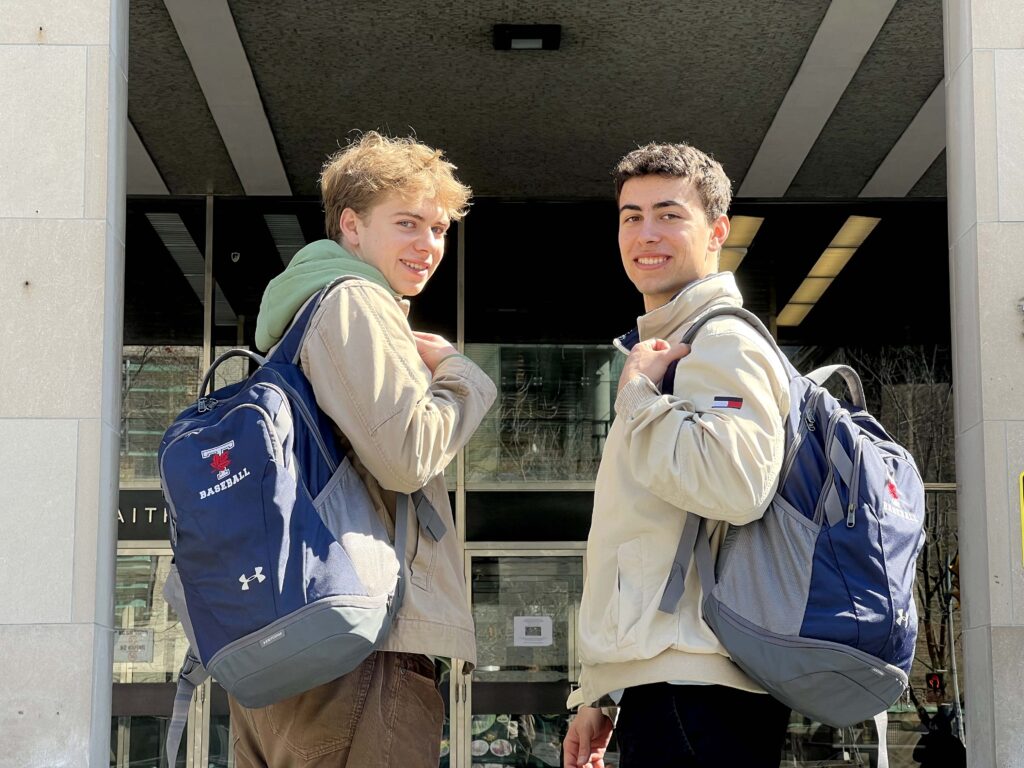
Brothers Paul Kosztowniak (Year 2 CivE) and Richard Kosztowniak (Year 3 CivE) both play on the Varsity Blues baseball team and are both studying Civil Engineering here at U of T Engineering. Richard is an infielder (#53) and Paul is a pitcher (#32). CivMin had a chat with the Kosztowniaks to see how they’ve balanced pursuing competitive sports, a demanding academic program and more.
Tell us a little about yourselves please.
Paul: We are brothers, from Etobicoke, grew up there, went to high school in Toronto and both of us have a desire to be a civil engineer. We both went into Civil Engineering at U of T. And also have been playing baseball for our whole lives. Luckily, we made the [U of T Varsity baseball] team and we’ve been doing both for a few years now.
What drew you to U of T?
Richard: Some of the things about U of T that appealed to me are it was close to home, so I can stay living at home, but also the fact it is the number one engineering school in Canada. I also like the way they set up the Engineering program with things like the PEY Co-op opportunity, which was very appealing to me. That, combined with it being ranked as the number one engineering school in Canada – one of the top in the world, was what made me decide to come here.
And, in particular, civil?
Paul: Civil engineering is just something that’s always been a little bit more interesting to me. Even before being in university, we both played with Lego a lot because it’s something that’s interesting to us. I really pay attention to infrastructure while on road trips, because I’m actually interested in how transportation systems are set up. I love riding the subway – I always look at the train tracks as we go by – that’s something I’ve always done since I was young. And we have a little bit of a family background in civil engineering, so that kind of probably inspired us as well.
Tell us about this family background in civil engineering.
Richard: We have a few relatives who work in the engineering field, specifically civil. We have an uncle who works as a civil and architectural engineer in Michigan – he’s a partner at his company. He showed us a lot of projects he’s worked on over the years and tells us about his experiences, and his trips to work on projects in different parts of the world.
It’s always interested me and my brother too. Every time we go somewhere, I like to look at the buildings, different architecture involved and I think that each city has different kinds of architectural features to see out there. My family went to Poland last year and one of my favourite parts about the trip was looking at different, older architecture on the buildings. It was really interesting to see how they do it there; it’s done differently in different parts of the world. And I think there’s a lot of interesting stuff that can be done in civil engineering, which is why I personally went into the field.
You said you played baseball, both of you, for most of your life lives and you grew up in the Toronto area, so you played in the area too?
Paul: We’re from Etobicoke, so I guess there’s some inspiration having one of the greatest current baseball players also from there. It kind of just played out that we play on the same rec team that he did when he was about our age, just a few years ago. That player is Joey Votto.
Playing baseball is just something that we started when we were young. We always enjoyed watching the Blue Jays play on TV. We figured if we were to get into a sport, that would probably be what’s most suitable for us. We’ve always enjoyed as long as we played, so we definitely never wanted to stop and we wanted to just keep going further with it.
Richard: And as for U of T baseball, when both me and my brother joined the school, we heard about the team and heard they’re a pretty good and pretty serious, relative to other teams in Ontario. It seemed like a really good opportunity to be able to keep playing at a high level while we’re studying our school. Baseball at U of T was definitely something that was appealing to me.
You both started as Varsity Blues athletes at the same time?
Paul: Yeah, we both tried out the same year, the same trial session. I’m in my second year for U of T baseball; in first year I started my first year of playing.
Richard: Yeah. We both walked on at the same time.
Paul: It’s been a lot of fun and a great experience. It worked out really well for us.
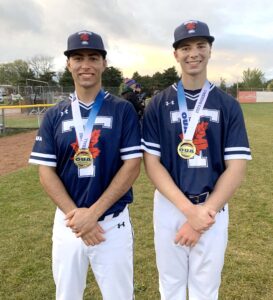
And how did how did the season go?
Paul: I mean, basically, very, very well. We won the OUA [Ontario University Athletics] Championship!
Richard: It was a great season – really fun. And it’s easy with our civil engineering curriculum too, because it’s condensed all into the month of September and half of October. So that’s when it’s pretty heavy with our scheduled games.
All of our games would be on the weekends – some exhibition during the week with practices during the week. But after that, we have a nice little break until the Christmas New Year’s break and then practices for the next season starting in January going to the beginning April. So it’s manageable and I feel like it’s a nice, manageable balance but also still competitive.
You alluded to how busy it is in the fall. You have workouts, practices, and then games. How many events each week? How do you find the time?
Paul: It’s busy. It’s probably four events on a weekend, two practices during weekdays and then some expectations to do lifts [at the gym] and stay in shape. But I really like the way the coaches, particularly head coach Andrew Needles, set up in their general attitude towards academics. They’re very understanding that this is a very academic school. They provide incentive to really achieve great things with baseball, and to really push ourselves there, but to not have it so that it conflicts with our schoolwork. So, we can still juggle both and do well.
Richard: I think it’s also the way that our coaches make it is it’s a very good experience in the sense that it doesn’t affect our school in a negative way when it could, it definitely could, right having such an intense sports program for that month and a half with so many games and being an engineering it can be pretty challenging, but our coaches allow it to be pretty doable. And then I’ve been doing it for two years. So as Paul and I think that just the fact that they understand that if you have to miss a practice, you know, if you have to miss like a team lift, it’s okay and they still expect you to you know, put in the work and try really hard but they understand that there are two sides of the story. And because of that, I would say I’ve been able to do it.
Richard, you’re completing third year now. Are you going to do a Professional Experience Year Co-op [PEY Co-op]?
Richard: I’m doing PEY Co-op this coming year. I’m hoping I’ll still be able to play on the baseball team too. My job is in Mississauga, at an infrastructure company, so I think it’s possible. My position will be pricing and estimating. That’s cool.
Paul, I’m gathering since you have a love of transportation, when it’s time for PEY Coop you might be looking for something in that area, right?
Paul: Yes, I’m hoping to find something like that. I’m definitely leaning towards transportation. I want to at least test the waters and see make sure it really is what I’m most interested in.
How about academically? Are there any classes that have stood out to you, or professors you really thought were a outstanding?
Richard: Yes, in my third year I found it a lot more interesting than first and second year, because we start to actually have courses that are specific to the types of civil engineering we can do. For example, there’s municipal, there’s transportation, there’s geotechnical engineering, there’s all those classes. And it’s great to be able to get a very specific learning experience for each one, so that I know it helps me choose which pathway I want to go into, and it helps me maybe rule some. Personally, I’ve been really interested with municipal engineering and also structural courses. We’ve done some design courses like steel and timber that have really interested me and even a second year of structural analysis. It’s helped me to be able to zone in what I wanted to go into.
Richard: I really liked my CIV340 Municipal Engineering instructor Florence Udenby [PhD candidate]. She makes it really interesting learning about how the how pipes and everything make up a city sewage system. And I’ve also really liked I really liked Professor [Jeffrey] Siegel. He taught my CIV375 Building Science course last semester and CIV380 Sustainable Energy systems this semester, and really makes it interesting. He exposes the different options that are out there for such methods of creating and storing energy and that also really interested me in building science. Those are some good memories I have of some classes.
Paul: I’m only a second year, so a lot of my courses haven’t gotten too specific in terms of civil engineering yet. It’s more theory and concepts at the moment. But some of my favourites make me feel reassured I’ve made the right choice with civil engineering. One is my CIV214 Structural Analysis course this year – I really like my professor. I really like the way he teaches a course
I really enjoyed what Antoine Pepin [PhD candidate] did for the CME210 Solid Mechanics course in first semester. I really enjoyed Professor [Jeffrey] Packer in CIV100 Mechanics. So, all of those being some of my favorites is really reassuring, because those are all very specific to civil engineering. Now I know I made a good choice with that.
Richard: It reminds me of first year I had some good experiences with Professor Packer, for Mechanics, as well as well as Professor Shai Cohen in my first year math. Both of those really stood out to me as my best learning experiences in first year.
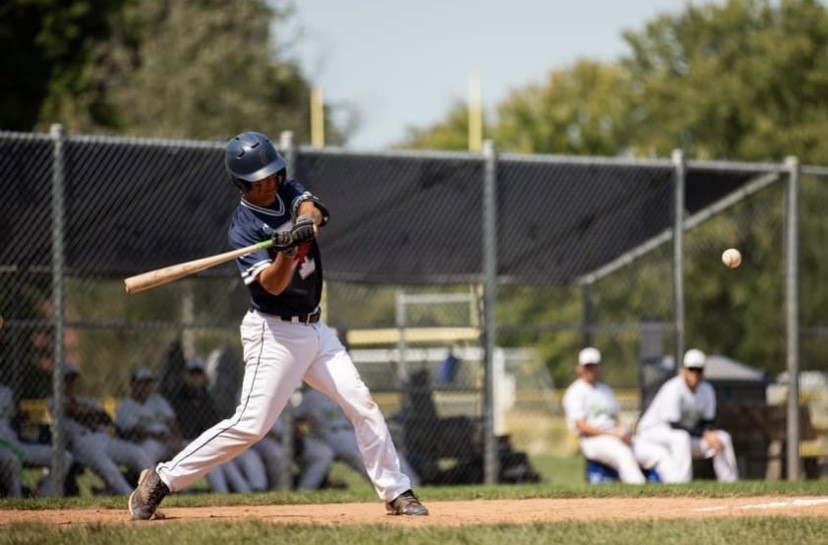
Richard, you went to Camp [for CME358 – Civil An Mineral Practicals / CAMP] this past summer. What was that like?
Richard: The Camp experience was really good. I went for the full two weeks in beginning of August. There’s two different sessions – you can go beginning of August to mid August, or mid August to end of August or early September.
It’s a really fun experience. You get to stay overnight there for two weeks and it’s right on a lake [Gull Lake by Minden, Ont.]. During the day, there’s three different stations, which you get rotated through every four days. One would be a mapping theme station where you learn how to use total stations, and measure different elevations, then at the end of those four days make a giant elevation map.
The second station was testing the water in the lake for eutrophication and you find out if there is eutrophication in the lake, then make a little presentation to your classmates and the teaching assistants.
Then the third station was working on the design of a highway curve. There was a patch of grass cut in the area surrounding the camp, and you would use total stations there again, find the elevations, do some math and then present on a piece of paper the potential curve that can be built for a highway in that space.
All those three different areas were really interesting to learn, because it’s beginning to apply stuff you learn in class to actual real world things that an engineer would do. It was a great experience in that regard. And it was a nice overall experience as well. Because after the day, when we’re done our work, we’d have free time in the evenings when we can go swimming, go canoeing, we can talk to our friends, or go build a campfire. There’s a lot of different things we could do. The food there was really great too!
So, overall, is a pretty good experience where it challenged you to learn new things, while working as a team in the field on projects, but also give you some relaxation time as a reward.
On campus, do you guys have the same, or perhaps different, go-to places if you have downtime, or to study?
Paul: I pretty much have my two favourite places I like to get work done and spend during downtime. The first one is a place I feel like isn’t too popular, so I really like it. It’s my little domain in the basement of Myhal, where they have an ECF [Engineering Computing Facility] lab down there, which is usually used for a Python course or when they do Math Lab in first year. It’s usually pretty quiet and we can get work done. If not there then usually Robarts, being our biggest library. I like to go there as well.
Richard: Personally, I’m more of a library guy, so I’ll go to Robarts or Gerstein Library. Robarts is pretty nice because there’s different floors, and so many different rooms, so you don’t get bored of going to the same place every time. There’s areas where there’s more people, so if you need you can stay with your friends and there’s quiet spaces where, if you’re by yourself, you can get some quiet studying done.
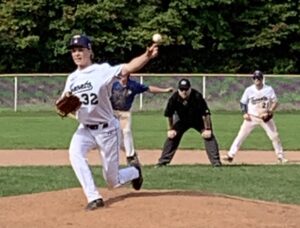
Do you have any special places, or a go-to spot, for a snack, lunch or a meal?
Paul: Definitely in terms of food, the first thing that comes to my mind is the food trucks outside of Bahen. I’m a big fan of what’s now the white truck – I don’t know the exact name.
For social, that’s when I would choose to study at Robarts, because just the amount of foot traffic and the amount of people there and like if you choose one of the busier rooms, you’re bound to run into somebody you know.
I also tend to have some of my social time at the gym – I try to organize this so I can go with friends. And I try to split going to the Athletic Centre or Goldring [Centre for High Performance Sport], depending on what my goal is for that day, because some specialize in different kinds of equipment.
Richard: For me, I’m social and food wise it’s kind of actually the same. Recently I’ve been going with my friends a lot to Sydney Smith because they have a cafeteria in the basement where you can order some food. You can also get hotdogs at the cart right outside Sidney Smith. Or you can bring your own lunch. Either way, there’s a lot of tables there where you can eat and that’s pretty nice experience. I’d say the gym as well – I go for social reasons. I got to the Goldring Centre more often, but I also do go to the Athletic Centre.
Is there any special talent you have or something interesting you might tell us about?
Paul: I will say I really, really like bowling. Near where I live there’s a bowling alley close to our house and it opens at 10a.m. So, if there’s a time when I don’t really have to come into school or when there’s no tutorials, sometimes I’ll try to go there early in the morning. Or also during my reading break or Christmas break or between semesters.
I can go multiple times a week myself alone, but it’s usually with friends. It’s not really a big social gathering. Sometimes I’ll go with Richard or it will be with one or two other friends. And, yeah, that’s pretty much my biggest hobby outside of school and baseball.
Richard: I guess it’d be actually kind of similar to Paul, but for me it’d be spikeball in the summertime. I love playing spikeball with my friends. We’ll go to a park or something like that. If you’re wondering what spikeball is, I can explain. It’s kind of like volleyball but a little bit different. There’s a circular net that’s on the ground and you have a small kind of bouncy inflatable ball, and basically work with a partner so you can hit it to each other. There’s a certain amount of times that you can touch it and then you can hit it down on the net and have that bounce over to the other side. They have to keep going back and forth and hit it back to you. It’s basically the first one to let it hit the ground that loses.
In closing, is there anything looking back on you’d give advice to somebody coming in to first year? Anything you’d say you should get involved with or any tips?
Paul: I would say don’t be afraid to join a team or club, because I know I was afraid coming in the first year. Lots of people told me how intensive the workload could be in Engineering, and I was worried that maybe it would be too much for me to handle. But, at the end of the day, I chose to join the baseball team in my first year. And I never regretted it for a second because, just as we mentioned earlier, the the coaches are very understanding. They set their expectations so it allows you to easily excel in both baseball and in your schoolwork. So being on the baseball team only gave me more opportunities. Obviously, in your first year you want to branch out to make new friends and things like that. It really only enriched my academic life and it definitely didn’t take anything away from it. I would definitely say don’t be afraid to join a team.
Richard: For me, I would say there’s a lot of resources out there in Engineering to help us do better in our courses. For example, you can go to office hours and talk to the professors. A lot of resources online just courses and Skule.ca, where you can go and find past midterms and exams. All that kind of stuff helps with studying for me when I started in first year. I didn’t know about any of that stuff, so I was kind of struggling when it comes to studying and keeping up with the material.
But then, as I spend more semesters in the program, I find out that there’s actually a lot of different things you can do. You can even use textbooks you can go to go to talk with your friends to study with your friends. There’s a lot of different ways out there to you can keep up to date with your course material. And in doing that it kind of helped me be able to balance a school and sport lifestyle because I was able to keep up with school. I found out about the resources that were available to me and it kind of helped me stay afloat and do well on my programs while also doing sports.
By Phill Snel
CivMin chatted with Troy Kang (CivE 2T0, MEng 2T2) about his continued studies and his journey in the MEng program with a construction management emphasis.
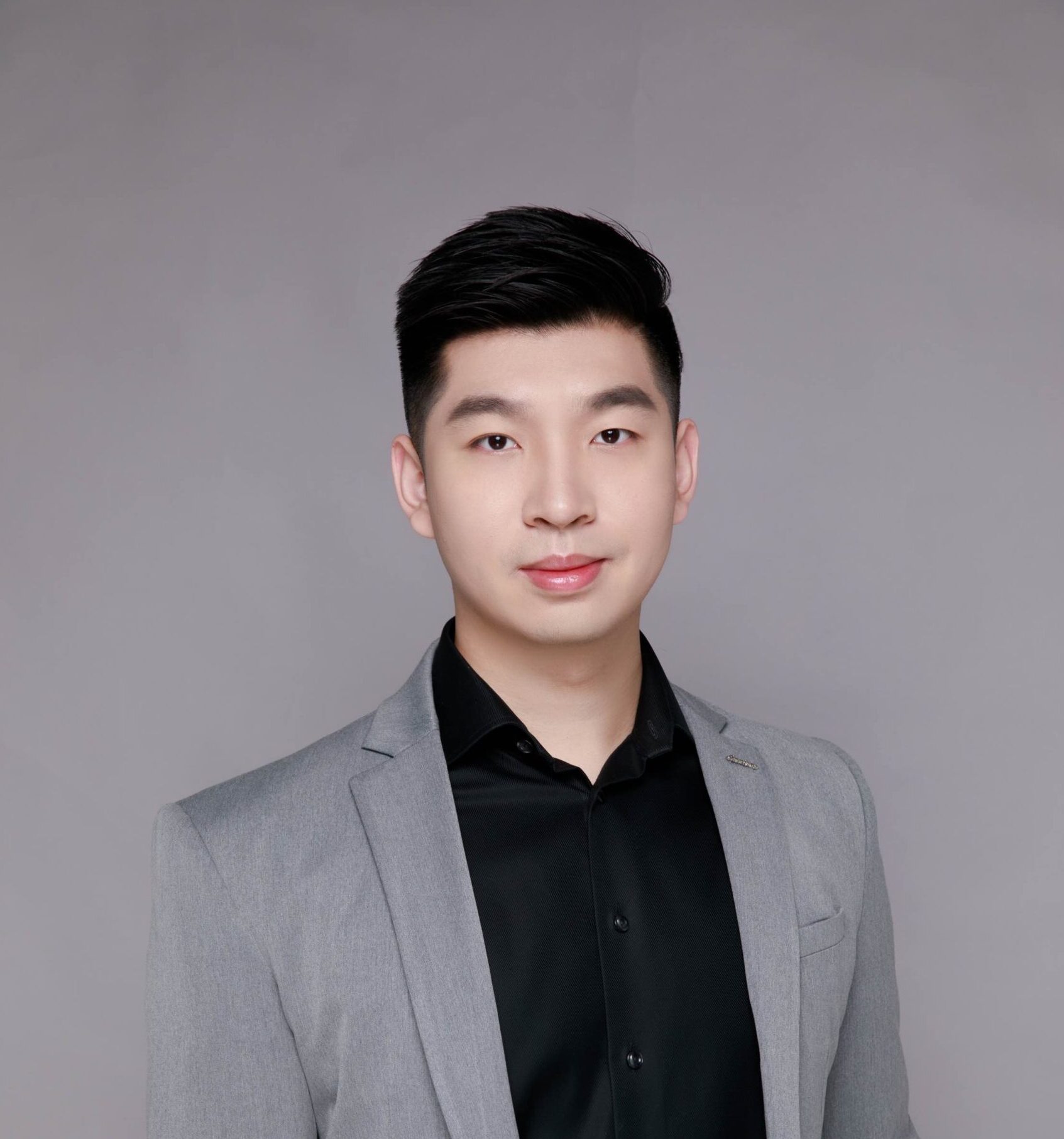
Could you introduce yourself, please?
I am Tongrui Kang, but I go by Troy. I’m a graduate of the University of Toronto, where I completed both my Bachelor of Applied Science [BASc] and Master of Engineering [MEng] in Civil Engineering. I proudly completed my studies in 2022.
Did you have an emphasis?
I specialized in construction management.
Do you recall any projects or assignments completed in your MEng program, which helped you build your portfolio or helped you during the interviewing process?
For my capstone project, I worked on Vision Zero Toronto, an initiative aimed at enhancing road safety. This project was a pivotal experience, bridging the gap between theoretical knowledge and practical application. It honed my skills in data collection, analysis and the vital ability to present complex information clearly to clients. The challenges and learning opportunities it presented were instrumental in refining my communication skills and understanding client needs.
“Professor Roorda’s continual guidance and support played a crucial role in my academic development, inspiring me to pursue a master’s degree.”
My capstone project choice for my bachelor’s degree in civil engineering was deeply influenced by my experiences and connections, particularly with Professor Matthew Roorda. His mentorship began in my freshman year during CIV331H1: Transport I – Introduction to Urban Transportation Systems course, igniting my interest in transportation. This interest led me to volunteer for the iCity project at UTTRI [University of Toronto Transportation Research Institute, now under Mobility Network], furthering my knowledge and passion in the field. This experience was also a decisive factor in my decision to pursue a Master of Engineering degree at the University of Toronto, to further my educational and professional journey.
Professor Roorda’s continual guidance and support played a crucial role in my academic development, inspiring me to pursue a master’s degree. In his class CIV1506H: Freight Transportation and ITS Applications, I explored the complexities of our pandemic-stricken food supply chain, deepening my understanding. These experiences highlight the importance of building relationships with professors, as their insights can greatly enhance one’s academic and career trajectory.
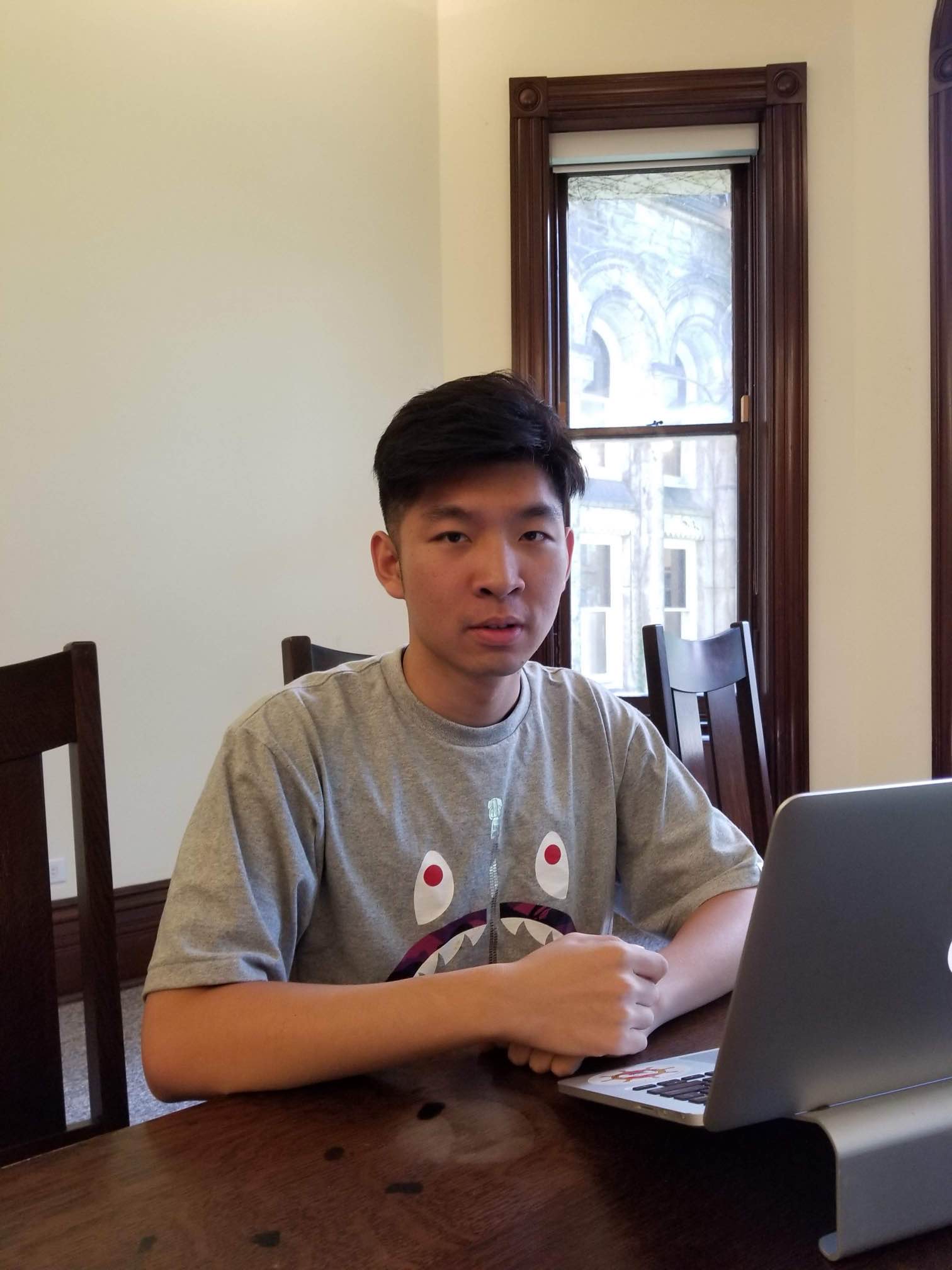
What was your favourite study spot on campus?
Fifth floor of Bahen Centre – this is a quiet place where you can get a great view of campus during the sunset.
How did your practicum go?
I did my practicum in a property management firm, Cushman & Wakefield. My practicum was aligned closely with professional project management roles. I actively engaged in client interactions, project planning, and team coordination. My responsibilities included managing project timelines, overseeing consultants, and ensuring adherence to budgets and policies. This hands-on experience honed my skills in communication, organization, and problem-solving, contributing significantly to my professional growth.
Are you still working with them?
So far, I’m working at a municipal design consulting firm called Schaeffer & Associates Ltd. Our goal is to help clients with land development. Or, in other words, more engineering design work!
How did the knowledge gained in CivMin’s MEng Program help you in your career?
The skills and knowledge acquired during my MEng program have been fundamental to my professional practice. In my daily routine, which includes road grading, pipe design, tributary area analysis, and water modelling, the hands-on experience and theoretical grounding from the program provided an excellent starting point. The opportunity to apply these concepts in a localized context during my MEng greatly enhanced my proficiency, and this continues to benefit me significantly in my current role.
What are your future plans?
Moving forward, my primary focus is on advancing my engineering skills to devise innovative solutions for clients and maintain high standards in engineering design roles. Additionally, I am keen on guiding the next generation of civil engineers. Being an alumnus, I am open to sharing my experiences and insights with students who are either considering or are currently pursuing a career in civil engineering, aiming to contribute to their growth and the broader engineering community.
“Be bold, give different paths a shot.”
Any suggestion for future MEng students, either domestic or international?
For future MEng students, domestic or international, I highly recommend exploring various disciplines. My own journey, from completing a business minor during my bachelor’s degree to engaging in builder development and eventually transitioning to consultancy during my MEng practicum, underscores the value of versatility. Connecting real-world problem-solving with engineering design is crucial. Embrace diverse experiences and remember, no one is defined by a single label. So, be bold, give different paths a shot, and discover where your true potential lies.
Can we get an inspiring quote from you in closing?
Always think ahead, and once a decision is made, persistently pursue it.
By Galina Nikitina
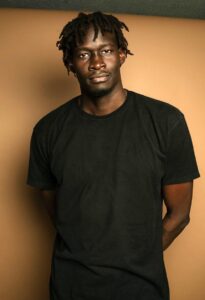
Aluong Jongkuch (Year 4 MinE) is the RockEng 2023 Undergraduate Scholarship winner.
Aluong is a fourth-year Lassonde Mineral Engineering student. He had the opportunity to experience underground hard rock mining during his PEY Co-op work term at Lac Des Iles Palladium Mine. He is planning to work in the mining industry to gain the experience necessary to become a P.Eng.
Growing up in a small neighbourhood in Cameroon, Maeva Che was aware of challenges of accessing clean drinking water.
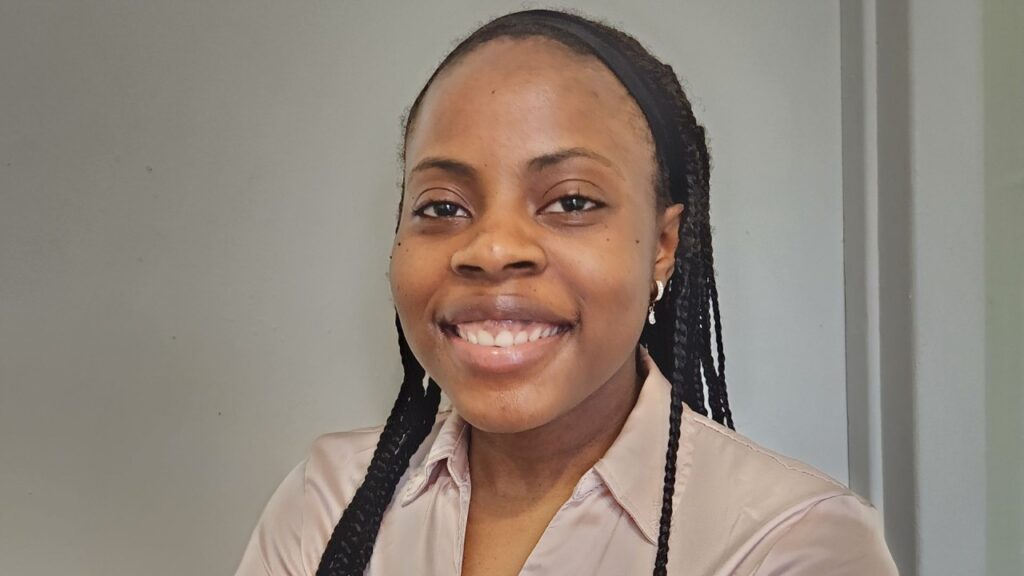
“Experiencing that exposure to water issues and challenges with sustainable access to safe drinking water ignited my interest in water treatment,” Che says.
Che’s drive to improve water quality challenges around the globe brought her to the University of Toronto’s Drinking Water Research Group (DWRG), where she is finding innovative solutions to solving local water issues.
A PhD candidate in the department of civil and mineral engineering, Che’s research focuses on removing unpleasant taste and odour compounds in Ontario’s drinking water by promoting the biodegradation of these compounds through granular activated carbon (GAC) filtration.
Under the supervision of Ronald Hofmann, a professor in the department of civil and mineral engineering and member of the DWRG, the project is supported by a five-year Natural Sciences and Engineering Research Council of Canada (NSERC) Alliance grant called, Advanced and Emerging Issues in Drinking Water Treatment.
A process used in water treatment plants, GAC filtration utilizes granular activated carbon, which is made from organic materials that are high in carbon, such as wood, coal, or coconut shells. These materials are heated in the absence of oxygen through a process known as pyrolysis and prompted chemically or physically to produce the activated carbon. The activation enhances the material’s adsorption properties, making it productive to remove contaminants from water.
While GAC filtration is an effective treatment process, its adsorptive capacity is limited. The adsorptive capacity of GAC is expected to become exhausted after about three years in service, so, drinking water treatment utilities must replace the GAC. Aside from the inconvenience, replacing GAC is costly.
Che is working on alternative ways to remove contaminants using GAC filtration, specifically through biodegradation. When GAC has been in service for a while, there is the growth of micro-organisms on the GAC, which can be useful for removing contaminants.
“Think of biodegradation as the useful bacteria on the GAC feeding on the contaminants in the water, thereby removing them.” Che explains.
“If the GAC has enough good bacteria that is biodegrading the compounds, the GAC may not need to be replaced when its adsorptive capacity becomes exhausted. This can extend the filter’s lifetime, resulting in cost benefits for treatment utilities.”
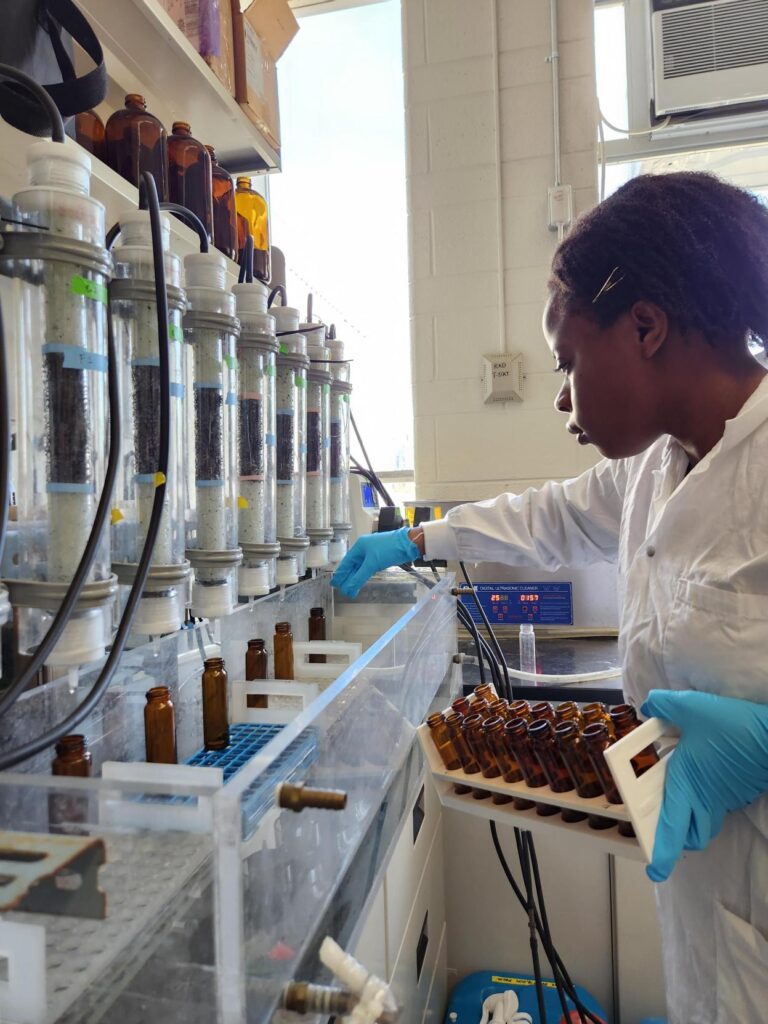
In other words, biodegradation can potentially enhance the performance of GAC filters.
Che and the DWRG will collaborate with water treatment plants to determine methods that can enhance the biodegradation of taste and odour compounds within their GAC filters.
Currently in its initial phase, the project is taking place alongside the Peterborough Utilities Group’s drinking water treatment plant, where Che is conducting pilot-scale filtration studies with support from the Peterborough Utilities Commission. They plan to extend this research to other partner treatment plants in the future.
Working with various water treatment plants across Ontario, Che will also assess the effectiveness of GAC filters in removing non-traditional taste and odour compounds which are not commonly monitored.
To achieve this, she’ll evaluate filter performance for two common taste and odour compounds – 2-methylisoborneal and geosmin – and eight additional non-traditional compounds that can cause taste and odour events. This involves collecting GAC and water samples from the plants and conducting lab-scale filtration tests, called minicolumn tests. This test, developed by the DWRG, allows to differentiate between adsorption and biodegradation in GAC filters.
Minicolumn tests provide crucial insights into the performance of the GAC filters in terms of the adsorption and biodegradation of contaminants. To distinguish between these mechanisms, researchers use parallel minicolumns. One minicolumn operates under conditions where the biological activity of micro-organisms is suppressed, which isolates the adsorption process. The second minicolumn operates without biological suppression, allowing both adsorption and biodegradation to occur.
“Many plants are unaware of their filters’ performance for other compounds, aside from the two common ones, that also contribute to taste and odour events in water. Our project, therefore, plays a crucial role in expanding the understanding of this,” Che says.
Some project partners include the Ajax Water Supply Plant and the Barrie Surface Water Treatment Plant.
Making a direct, practical impact
The DWRG is made of approximately 30 graduate students, post-doctoral fellows, research managers, and associates who collaborate with local, national and international industry and government organizations to address a wide range of projects related to municipal drinking water.
Che credits her experience as a master’s student with the research group as a major factor in her decision to pursue a PhD at the University of Toronto.
“During my master’s degree with the DWRG, I worked on projects that improved drinking water quality, gaining hands-on experience at treatment plants. Seeing the results of my research reinforced my decision to pursue my PhD here,” Che says.
Ultimately, Che hopes to make a significant impact in the field – and the DWRG provides opportunities to achieve this, with a supportive community of researchers and supervisors.
“My goal is to continue researching and developing sustainable solutions for drinking water treatment that benefit communities in need,” Che says.
By Tina Adamopoulos
This story University of Toronto Black Research Network